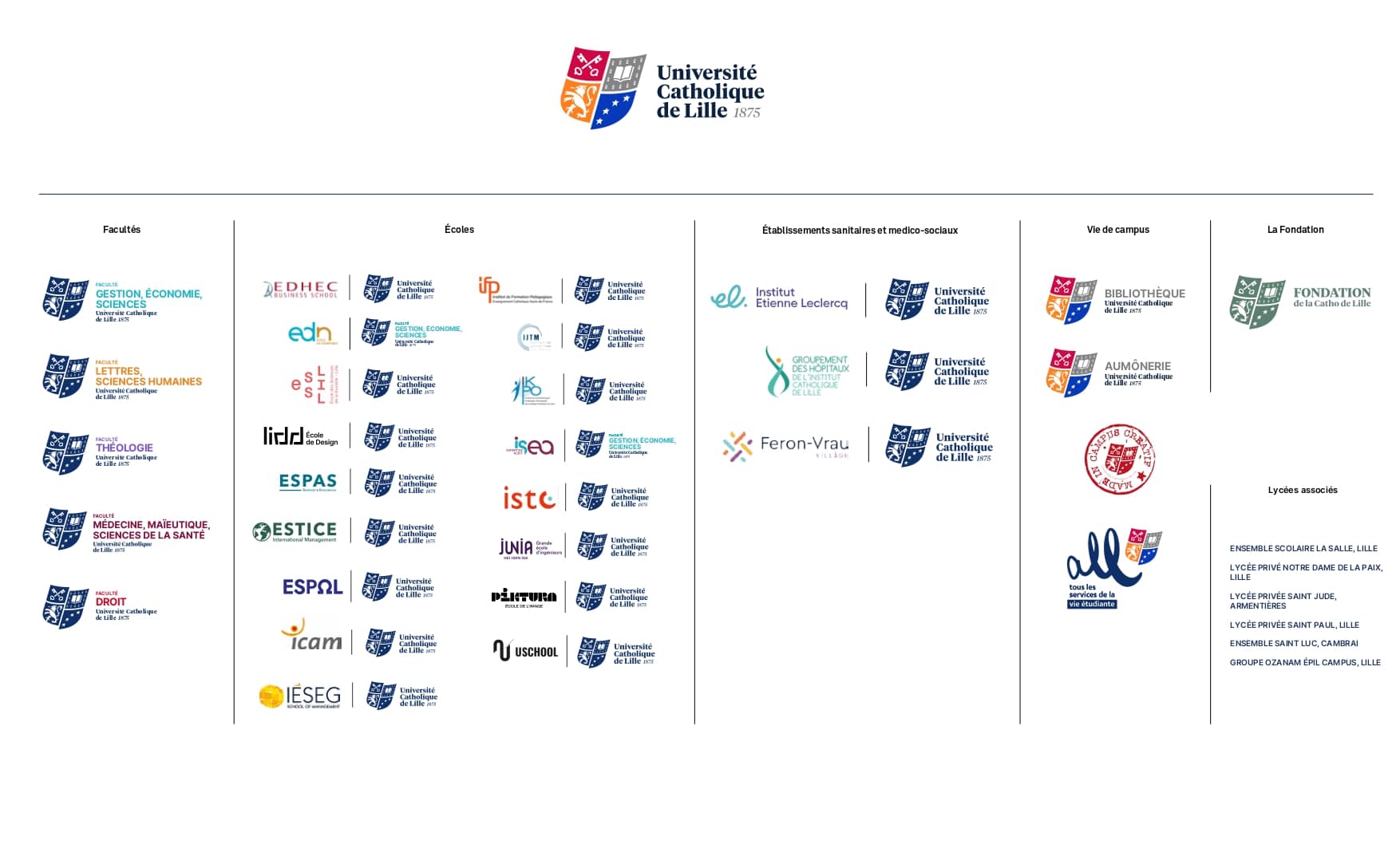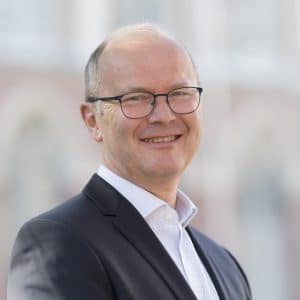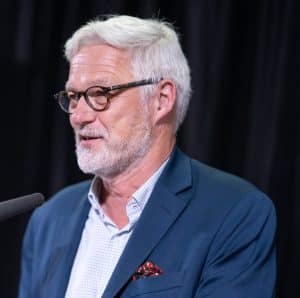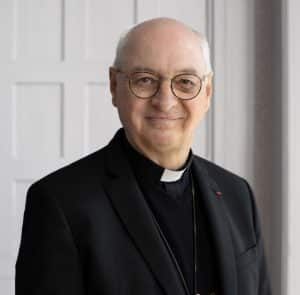The Université Catholique de Lille federates higher education institutions of all disciplines and care institutions that have emerged for more than a century around the Institut Catholique de Lille, which was first established in 1875 as an association under the Law of July 12, 1875.
Today, it has members of the Institut Catholique de Lille with its faculties, hospitals and care institutions, engineering and business schools, a university library, a student service institution (health, housing, catering, sport), as well as high schools offering higher education as associated members.
Organization

Governance of the Université Catholique de Lille

Patrick Scauflaire, President-Rector of the Université Catholique de Lille
President-Rector since 2020
Patrick Scauflaire, a scientific and industrial career marked by the international dimension
Patrick Scauflaire graduated from the École Polytechnique in 1984 and the École des Mines de Paris (option Engineering of processes) in 1986. He started his career as a process engineer in the technical direction of the Solvay Group in Belgium. In 1989, he continued his professional career as a manufacturing and project engineer in Brazil. He returned to France in 1995, where he became production director in Moselle.
In 2001, Patrick Scauflaire joined the BP Chemicals group in Brussels as a Business Technology Manager. In 2003, he obtained new responsibilities as Strategy Manager and then Director of Research and Technology of Europe at the BP Chemicals headquarters in London.
An experience of the associative world and higher education
Patrick Scauflaire then chose a social orientation by joining the Fondation Apprentis d’Auteuil (Foundation Apprentices in Auteuil) in 2005. In 2006, he was appointed Deputy General Director for Institutions and Projects.
In 2015, he took over the direction of the ICAM (Institut Catholique des Arts et Métiers, Catholic Institute of Arts and Crafts) of Lille, which is part of the Université Catholique de Lille. He completed his executive MBA education at HEC in 2016.
Multiple commitments
Patrick Scauflaire became a permanent deacon of the Catholic Church in 2002 with a canonical licentiate from the Institut Catholique de Paris. He advises a team of Christian entrepreneurs and leaders.
Patrick Scauflaire has chaired the board of the Conférence Régionale des Grandes Écoles (Regional Conference of Grandes Écoles) and the Centre de Formation par Apprentissage (Center for Learning through Apprenticeship) FormaSub. He was a member of the Board of Directors of the ACSC (Association des Cités du Secours Catholique – Cities Association of the Catholic Relief) and of the UNIOPSS (Union Nationale Interfédérale des Œuvres et Organismes Privés non lucratifs Sanitaires et Sociaux – National Interstate Union of Charities and Private Health and Social Charity Organizations).
From 2020 to 2024, he has chaired the UDESCA (Union des Établissements d’Enseignement Supérieur Catholique – Union of Catholic Higher Education Institutions).

Crédit photo : Estelle Carlier
Pascal Balmand, General Administrator of the Université Catholique de Lille
General Administrator since 2021
An alumnus of the École Normale and with an agrégation in history, Pascal Balmand was a professor at the Lycée Français of Brussels, in preparatory classes, and a lecturer at the Institut d’études politiques (Institute of Political Studies – IEP) in Paris.
After this career in education, Pascal Balmand became the head of the Paris Saint-Michel de Picpus school system. In addition to this new posting, he was vice-president of the Syndicat national des chefs d’établissement d’enseignement libre (National Union of Heads of Free Education Institutions).
From 2006, Pascal Balmand continued his career as the diocesan director of Catholic Education in Seine-Saint-Denis before becoming the Secretary General of Catholic Education in 2013 for two three-year mandates.
In 2020, he renewed his commitment to education within the Board of Directors of Apprentis d’Auteuil.
From 2020 to 2023, he was “Delegated to Integral Ecology” at the Bishops Conference of France (CEF).

Crédit photo : Gautier Deblonde
Mgr Laurent Le Boulc'h, Chancellor of the Université Catholique de Lille
Chancellor of the Université Catholique de Lille since 2023
He was appointed Archbishop of Lille on April 1, 2023, and installed on May 20, 2023, in the Cathedral Notre-Dame-de-la-Treille in Lille by Jean-Marc AVELINE, the Cardinal and Metropolitan Archbishop of Marseille, in the presence of Celestino MIGLIORE, the apostolic nuncio in France. He succeeded Mgr Laurent ULRICH, who was appointed Paris Archbishop and Chancellor of the Université Catholique de Lille.
Laurent Le Boulc’h joined the Interdiocesan Seminar in Vannes in 1980. He was ordained as a priest on June 19, 1988, in the Saint-Etienne de Saint-Brieuc Cathedral for the Saint-Brieuc diocese. He has a canonical licentiate in theology.
Laurent Le Boulc’h had several functions in his original diocese. He started his career as a vicar of the Saint-Etienne Cathedral from 1988 to 1991 and then resumed his studies at the Catholic Institute of Paris from 1991 to 1993.
From 1993 to 2005, he was the episcopal vicar of the diocese, responsible for youth ministry, diocesan education accompaniment, the Scouts and French Guides, chaplaincy in public education, and Christian initiation. In 2003, he was also responsible for permanent education and became an episcopal delegate for information.
Presidency-Rectorate
President-Rector, Patrick SCAUFLAIRE
President, Vice-Rector for Humanities, Fr. Franck DUBOIS
Vice-President, Vice-Rector for Social Health, Laurent DELABY
Vice-President, Vice-Rector for Research and Innovation, Nicolas VAILLANT
Vice-President, Vice-Rector for International Development, Ioannis PANOUSSIS
Vice-President for Territorial University Alliances, Vice-Rector for Academic Affairs, Catherine DEMAREY
Vice-Presidents for Student Life, Caroline ROUSSEL and Piero TURCHI
Vice-President for Energy and Societal Transition, Benoît ROBYNS
Vice-Presidents AI and Education, Antoine BLONDELLE and Jean-Charles CAILLIEZ
Vice-Presidents Foresight and Strategy, Jean-Marc ASSIÉ and Bertrand LÉDÉE
Director General of Services, Bertrand LÉDÉE
Cabinet Director, Denis VINCKIER
Special Advisor to the President-Rector, Christophe BELLON
General Delegate for Companies and Partnerships & the Fondation de la Catho, Didier PEILLON
Director of Communications and Operational Marketing, Yannick URBANSKI
The Instances
Board of Directors
The Board of Directors is invested with broad powers to administer the Federation and authorizes any acts not reserved for the General Assembly.
The Board of Directors shall terminate the accounts of the year closed.
It defines the period and duration of the accounting year in the Rules of Procedure and reports its activities and decisions to the General Assembly.
It is convened whenever necessary and at least once a year before the General Assembly or, exceptionally, at the joint initiative of the Administrator General and the Executive President.
The agenda of the Board of Directors is established by the General Administrator and the Executive President.
University Council
The University Council represents the various members of the University Community and participates in implementing the strategy and the academic project.
It is based on the work of commissions: it collects their advisory opinions, especially about the budget and account closing.
The University Council offers proposals and places to exchange and communicate, especially in order to provide good information to members and to collect their suggestions and opinions.
The University Council is competent for any issues of common interest, whether academic, financial, or administrative.
It convenes at least twice a year.
The University Council is convened and chaired by the Executive President, who sets its agenda.
General Assembly
The General Assembly is competent for any issues of common interest within the Federation’s object and administration.
The General Assembly, in close contact with the Higher Council, which recommends the general policy orientations, defines and organizes the long-term development of the Université Catholique de Lille and settles the medium-term action programs after the required consultations. It votes for the strategic orientations of the Université Catholique de Lille and ensures their implementation.
It votes on the budget and decides on the management report.
The General Assembly accepts the donations and legacies conferred to the Université Catholique de Lille and their possible charges in accordance with the current texts.
It decides on the acquisitions, assignments, or exchanges of real estate. . .
It decides on the accession or withdrawal of the Université Catholique de Lille to any declared structure.
It designates one or more account auditors.
It decides on the creation of advisory commissions.
The General Assembly convenes at least once a year at a date set by the Board of Administration. The agenda, set by the Board of Administration, is indicated on the convocations. The Assembly may deliberate only on this agenda.
The President of the Higher Council is, by right, the General Administrator. In this capacity, the President convenes and presides over the General Assembly.
Each member of the Federation has several votes proportional to their workforce (students/beds/places). Full-right members (the Chancellor, the General Administrator, and the Executive President) each have a quarter of the votes of the most prominent academic member.
Higher Council
Reference to the Statutes as of May 17, 2017
Reference to the Rules of Procedure as of June 25, 2019
The Higher Council is the instance guaranteeing the fidelity of the Federation to the preamble of the statutes. It has the following competencies:
- Recommending general policy orientations
- Accepting or excluding members
- Deciding potential conflicts between other bodies of the Federation
- Organizing conciliation procedures
- Ensuring the respect of its members’ commitments
- Certifying the Charter in connection with the General Assembly
- Certifying the Executive President of the University, elected by the University Council
It convenes at least twice a year at the invitation of its president. The University’s Executive President is present at the Higher Council meetings but does not participate in the vote.
Each full member has 1 vote. In the case of an equal number of votes, that of the President of the Higher Council will be the deciding vote.
Co-opted members have a deliberative voice.
Setting up of a new Higher Council during the second semester of the calendar year in which the election of the Executive President of the University is held.
Prorogation of the Higher Council at the time of the election until the installation meeting of a new Higher Council.
Chancellor
The Chancellor ensures the Federation’s fidelity to the object it has assigned itself and to the Catholic character of the Institution.
The Chancellor gives their approval for the election of the Higher Council President and that of the Executive President.
President of the Higher Council
A layperson engaged in church and society embodies civil society at the university. They serve as the General Administrator of the Federation and preside over the General Assembly and the Federation’s Board of Directors.
Approval of candidates by the Chancellor.
Presidents come from the co-opted members outside the University and are elected for 5 years.


